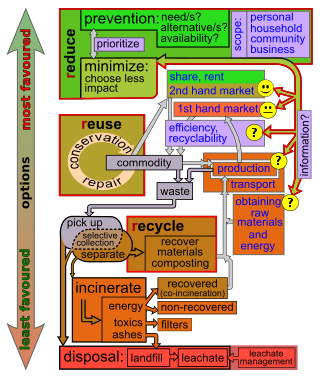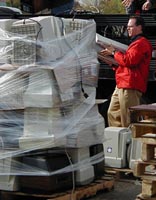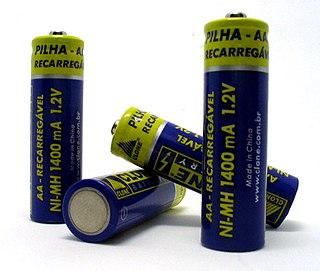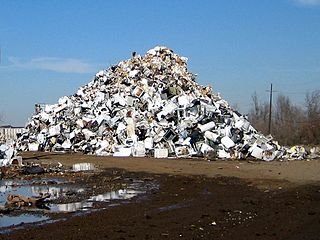
Recycling is the process of converting waste materials into new materials and objects. This concept often includes the recovery of energy from waste materials. The recyclability of a material depends on its ability to reacquire the properties it had in its original state. It is an alternative to "conventional" waste disposal that can save material and help lower greenhouse gas emissions. It can also prevent the waste of potentially useful materials and reduce the consumption of fresh raw materials, reducing energy use, air pollution and water pollution.

The Waste Electrical and Electronic Equipment Directive is a European Community Directive, numbered 2012/19/EU, concerned with waste electrical and electronic equipment (WEEE). Together with the RoHS Directive 2011/65/EU, it became European Law in February 2003. The WEEE Directive set collection, recycling and recovery targets for all types of electrical goods, with a minimum rate of 4 kilograms (9 lb) per head of population per annum recovered for recycling by 2009. The RoHS Directive set restrictions upon European manufacturers as to the material content of new electronic equipment placed on the market.

Extended producer responsibility (EPR) is a strategy to add all of the estimated environmental costs associated with a product throughout the product life cycle to the market price of that product, contemporarily mainly applied in the field of waste management. Such societal costs are typically externalities to market mechanisms, with a common example being the impact of cars.

Waste (management) hierarchy is a tool used in the evaluation of processes that protect the environment alongside resource and energy consumption from most favourable to least favourable actions. The hierarchy establishes preferred program priorities based on sustainability. To be sustainable, waste management cannot be solved only with technical end-of-pipe solutions and an integrated approach is necessary.

Electronic waste recycling, electronics recycling, or e-waste recycling is the disassembly and separation of components and raw materials of waste electronics; when referring to specific types of e-waste, the terms like computer recycling or mobile phone recycling may be used. Like other waste streams, reuse, donation, and repair are common sustainable ways to dispose of IT waste.

Electronic waste describes discarded electrical or electronic devices. It is also commonly known as waste electrical and electronic equipment (WEEE) or end-of-life (EOL) electronics. Used electronics which are destined for refurbishment, reuse, resale, salvage recycling through material recovery, or disposal are also considered e-waste. Informal processing of e-waste in developing countries can lead to adverse human health effects and environmental pollution. The growing consumption of electronic goods due to the Digital Revolution and innovations in science and technology, such as bitcoin, has led to a global e-waste problem and hazard. The rapid exponential increase of e-waste is due to frequent new model releases and unnecessary purchases of electrical and electronic equipment (EEE), short innovation cycles and low recycling rates, and a drop in the average life span of computers.

Reuse is the action or practice of using an item, whether for its original purpose or to fulfill a different function. It should be distinguished from recycling, which is the breaking down of used items to make raw materials for the manufacture of new products. Reuse—by taking, but not reprocessing, previously used items—helps save time, money, energy and resources. In broader economic terms, it can make quality products available to people and organizations with limited means, while generating jobs and business activity that contribute to the economy.

The Directive 2006/66/EC of the European Parliament and of the Council of 6 September 2006 on batteries and accumulators and waste batteries and accumulators and repealing Directive 91/157/EEC, commonly known as the Battery Directive, regulates the manufacture and disposal of batteries in the European Union with the aim of "improving the environmental performance of batteries and accumulators".
Water supply and sanitation (WSS) in the European Union (EU) is the responsibility of each member state, but in the 21st century union-wide policies have come into effect. Water resources are limited and supply and sanitation systems are under pressure from urbanisation and climate change. Indeed, the stakes are high as the European Environmental Agency found that one European out of ten already suffers a situation of water scarcity and the IEA measured the energy consumption of the water sector to be equivalent to 3,5% of the electricity consumption of the EU.

In 2015, 43.5% of the United Kingdom's municipal waste was recycled, composted or broken down by anaerobic digestion. The majority of recycling undertaken in the United Kingdom is done by statutory authorities, although commercial and industrial waste is chiefly processed by private companies. Local Authorities are responsible for the collection of municipal waste and operate contracts which are usually kerbside collection schemes. The Household Waste Recycling Act 2003 required local authorities in England to provide every household with a separate collection of at least two types of recyclable materials by 2010. Recycling policy is devolved to the administrations of Scotland, Northern Ireland and Wales who set their own targets, but all statistics are reported to Eurostat.
RepaNet is an environmental and employment creation project based in Graz, Austria. It combines three complementary goals: the ecological goal of cutting waste by repairing and reusing things instead of throwing them away, the social goal of providing jobs for long-term unemployed people and the local economy goal of supporting small firms and building regional value.

Sims Limited (formerly Sims Metal Management Limited) is a global environmental services conglomerate, operating through a number of divisions, with a focus on: (a) Ferrous and Non-ferrous metal recycling, (b) enterprise data destruction and cloud asset management (c) post-consumer electronic goods recycling and reuse, (d) municipal waste recycling, (e) gas to energy, and (f) waste to energy. Founded in 1917, its primary operations are located in the United States, Australia and the UK.
The End of Life Vehicles Directive is a Directive of the European Union addressing the end of life for automotive products. Every year, motor vehicles which have reached the end of their useful lives create between 8 and 9 million tonnes of waste in the European Union. In 1997, the European Commission adopted a Proposal for a Directive to tackle this problem.
Solving the E-waste Problem (StEP) is a membership organization that is part of United Nations University and was created to develop solutions to address issues associated with electronic waste. Some of the most eminent players in the fields of Production, Reuse and Recycling of Electrical and Electronic Equipment (EEE), government agencies and NGOs as well as UN Organisations count themselves among its members. StEP encourages the collaboration of all stakeholders connected with e-waste, emphasising a holistic, scientific yet applicable approach to the problem.

The World Reuse, Repair and Recycling Association (WR3A) is a business consortium dedicated to the reform of the trade of e-waste. The WR3A is inspired by fair trade organizations.

Electronic waste is a significant part of today's global, post-consumer waste stream. Efforts are being made to recycle and reduce this waste.
A sustainability organization is (1) an organized group of people that aims to advance sustainability and/or (2) those actions of organizing something sustainably. Unlike many business organizations, sustainability organizations are not limited to implementing sustainability strategies which provide them with economic and cultural benefits attained through environmental responsibility. For sustainability organizations, sustainability can also be an end in itself without further justifications.

A circular economy is a model of resource production and consumption in any economy that involves sharing, leasing, reusing, repairing, refurbishing, and recycling existing materials and products for as long as possible. The concept aims to tackle global challenges such as climate change, biodiversity loss, waste, and pollution by emphasizing the design-based implementation of the three base principles of the model. The main three principles required for the transformation to a circular economy are: designing out waste and pollution, keeping products and materials in use, and regenerating natural systems. CE is defined in contradistinction to the traditional linear economy.

Appliance recycling is the process of dismantling scrapped home appliances to recover their parts or materials for reuse. Recycling appliances for their original or other purposes, involves disassembly, removal of hazardous components and destruction of the equipment to recover materials, generally by shredding, sorting and grading. The rate at which appliances are discarded has increased due in part to obsolescence due to technological advancement, and in part to not being designed to be repairable. The main types of appliances that are recycled are televisions, refrigerators, air conditioners, washing machines, and computers. When appliances are recycled, they can be looked upon as a valuable resources; if disposed of improperly, they can be environmentally harmful and poison ecosystems.













